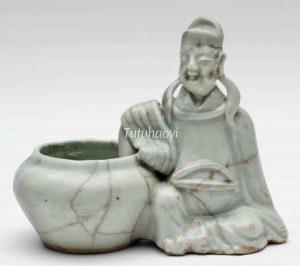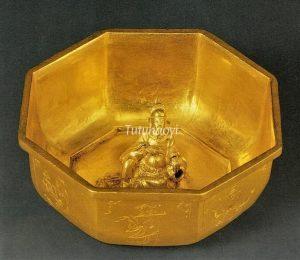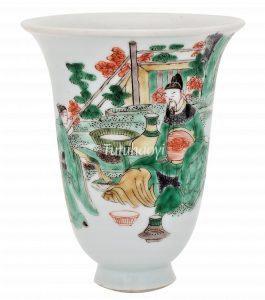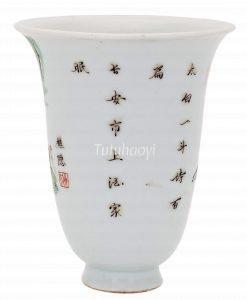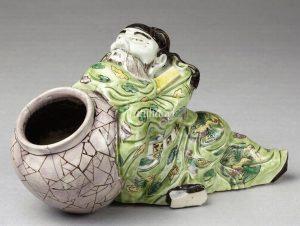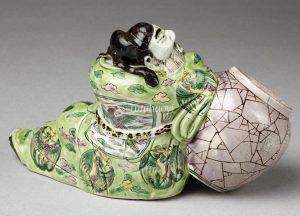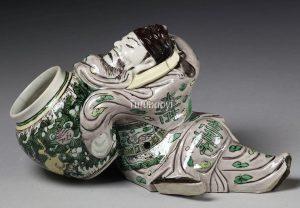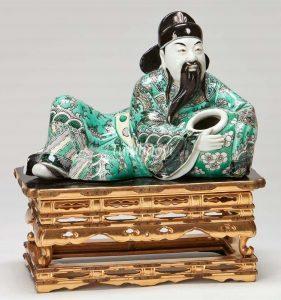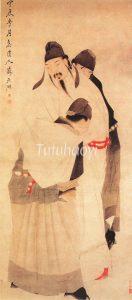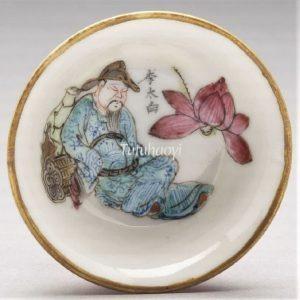Li Bai Getting Drunk
太白醉酒 (李白醉酒)
© Tutuhaoyi.com owns the copyright of the description content for the images attached. Quoting all or part of the description content on this page is permitted ONLY IF ‘Tutuhaoyi.com’ is clearly acknowledged anywhere your quote is produced unless stated otherwise. (本页描述内容版权归Tutuhaoyi.com所有,转发或引用需注明 “Tutuhaoyi.com”, 侵权必究, 已注开源信息的条目除外。)
Li Bai (李白, courtesy name Taibai 太白, 701–762) from Tang dynasty (618–907) was one of the greatest poets in Chinese history. He was also famous for his love of wine and was extremely productive in writing poems while he got tipsy.
Typically, the scene in Fig. 3 depicts one of the Eight Immortals of the Wine Cup, a painting subject based on the poem ‘A Song to the Eight Intoxicated Literati 饮中八仙歌’ by the Tang dynasty poet, Li Bai’s friend and counterpart, Du Fu (杜甫 712–770). In the poem, Du Fu chose eight prominent men of letters of his time and portrayed them with their drunken antics. Here are his lines for Li Bai (refer to Fig 4):
As for Li Bai, give him a jugful,
He will write one hundred poems.
He drowses in a wine-shop
On a city street of Capital Chang’an;
And though His Majesty calls,
He will not board the imperial barge.
“Please your Majesty,” says he,
“I am a god of wine.”
“李白一斗诗百篇,
长安市上酒家眠,
天子呼来不上船,
自称臣是酒中仙。”
In Fig. 3, Li Bai appears a bit tipsy, surrounded by wine jars and huge drinking vessels, while the courtier is trying to present him with a scroll of the emperor’s edict.
story scene description by Dr Yibin Ni
People who appear drunk in other story scenes:
Scholar Zhang Getting Drunk Due to Madam Cui’s Broken Promise 张生醉酒
Fig 1: brush washer, 13th century, courtesy of Philadelphia Museum of Art
Fig 2: gold octagonal cup, Ming dynasty (1368–1644), courtesy of Capital Museum, Beijing, China
Fig 3-4: porcelain cup with overglaze enamelled decoration, Kangxi period (1662–1722), Qing dynasty, courtesy of the Jie Rui Tang Collection
Fig 5-6: porcelain water pot, Kangxi period (1662–1722), Qing dynasty, courtesy of the Victoria & Albert Museum, London
Fig 7: porcelain water pot, Kangxi period (1662–1722), Qing dynasty, courtesy of the Victoria & Albert Museum, London
Fig 8: porcelain water pot, Kangxi period (1662–1722), Qing dynasty, courtesy of the Minneapolis Institute of Art
Fig 9: Taibai Getting Drunk 太白醉酒图, hanging scroll, ink and colour on paper, Su Liupeng (1791–1862), Qing dynasty (1644–1911), courtesy of Shanghai Museum, China
Fig 10: porcelain dish with overglaze enamelled decoration, Qing dynasty (1644–1911), courtesy of Philadelphia Museum of Art
